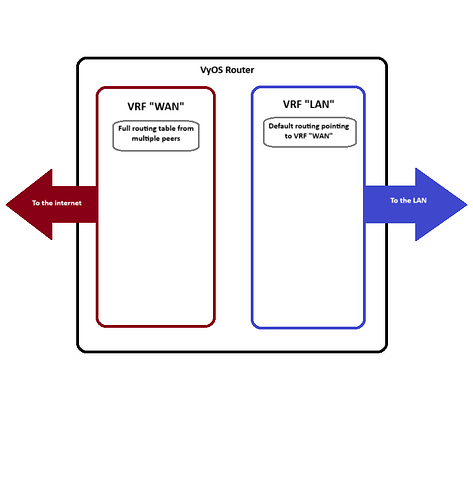Hello VyOS community!
Recently I was playing with VRFs and route leaking between then.
My goal is to segregate WAN and LAN VRFs, while WAN VRF will be used to do BGP peering with multiple peers and keep a full routing table and LAN VRF will only have a default route pointing to WAN VRF.
I was able to configure it as needed using @giuppo77 answer from Vrf: default rout leaking, and this is my current configuration at the moment:
Interfaces:
interfaces {
bonding bond0 {
vif 50 {
address x.x.x.2/30
vrf WAN
}
vif 100 {
address y.y.y.3/24
vrf LAN
}
}
virtual-ethernet veth0 {
address 10.255.255.1/30
peer-name veth1
vrf WAN
}
virtual-ethernet veth1 {
address 10.255.255.2/30
peer-name veth0
vrf LAN
}
}
VRFs:
vrf {
name LAN {
protocols {
static {
route 0.0.0.0/0 {
next-hop 10.255.255.1 {
interface veth1
}
}
}
}
table 1000
}
name WAN {
protocols {
bgp {
neighbor 172.29.21.1 {
address-family {
ipv4-unicast {
nexthop-self {
}
route-map {
export DENY
}
soft-reconfiguration {
inbound
}
}
}
remote-as 22222
update-source 172.29.21.2
}
system-as 11111
}
}
table 2000
}
}
To me that kind of configuration should work. A packet would arrive at bond0.100 and “LAN” VRF, follow the default route to 10.255.255.1 and get into “WAN” VRF, where the full routing table is, but looks like it’s being altered in it’s way:
19:12:34.592302 eth5 In ifindex 7 cc:cc:cc:cc:cc:cc ethertype IPv4 (0x0800), length 104: y.y.y.119 > z.z.z.z: ICMP echo request, id 56, seq 1, length 64
19:12:34.592302 bond0 In ifindex 10 cc:cc:cc:cc:cc:cc ethertype IPv4 (0x0800), length 104: y.y.y.119 > z.z.z.z: ICMP echo request, id 56, seq 1, length 64
19:12:34.592302 bond0.100 In ifindex 11 cc:cc:cc:cc:cc:cc ethertype IPv4 (0x0800), length 104: y.y.y.119 > z.z.z.z: ICMP echo request, id 56, seq 1, length 64
19:12:34.592340 veth1 Out ifindex 15 bb:bb:bb:bb:bb:bb ethertype IPv4 (0x0800), length 104: y.y.y.119 > z.z.z.z: ICMP echo request, id 56, seq 1, length 64
19:12:34.592343 veth0 In ifindex 16 bb:bb:bb:bb:bb:bb ethertype IPv4 (0x0800), length 104: y.y.y.119 > z.z.z.z: ICMP echo request, id 56, seq 1, length 64
19:12:34.592364 bond0.50 Out ifindex 14 aa:aa:aa:aa:aa:aa ethertype IPv4 (0x0800), length 104: y.y.y.119 > z.z.z.z: ICMP echo request, id 13623, seq 1, length 64
19:12:34.592366 bond0 Out ifindex 10 aa:aa:aa:aa:aa:aa ethertype IPv4 (0x0800), length 104: y.y.y.119 > z.z.z.z: ICMP echo request, id 13623, seq 1, length 64
19:12:34.592369 eth4 Out ifindex 6 aa:aa:aa:aa:aa:aa ethertype IPv4 (0x0800), length 104: y.y.y.119 > z.z.z.z: ICMP echo request, id 13623, seq 1, length 64
Notice how the packet id changes when the packet comes from veth0 to bond0.50
If I set de default route to one my upstreams directly the packet is not modified:
name LAN {
protocols {
static {
route 0.0.0.0/0 {
next-hop 172.29.21.1 {
vrf WAN
}
}
}
}
table 1000
}
19:11:39.697734 eth4 In ifindex 6 cc:cc:cc:cc:cc:cc ethertype IPv4 (0x0800), length 104: y.y.y.119 > z.z.z.z: ICMP echo request, id 54, seq 1, length 64
19:11:39.697734 bond0 In ifindex 10 cc:cc:cc:cc:cc:cc ethertype IPv4 (0x0800), length 104: y.y.y.119 > z.z.z.z: ICMP echo request, id 54, seq 1, length 64
19:11:39.697734 bond0.100 In ifindex 11 cc:cc:cc:cc:cc:cc ethertype IPv4 (0x0800), length 104: y.y.y.119 > z.z.z.z: ICMP echo request, id 54, seq 1, length 64
19:11:39.697773 bond0.50 Out ifindex 14 aa:aa:aa:aa:aa:aa ethertype IPv4 (0x0800), length 104: y.y.y.119 > z.z.z.z: ICMP echo request, id 54, seq 1, length 64
19:11:39.697775 bond0 Out ifindex 10 aa:aa:aa:aa:aa:aa ethertype IPv4 (0x0800), length 104: y.y.y.119 > z.z.z.z: ICMP echo request, id 54, seq 1, length 64
19:11:39.697779 eth4 Out ifindex 6 aa:aa:aa:aa:aa:aa ethertype IPv4 (0x0800), length 104: y.y.y.119 > z.z.z.z: ICMP echo request, id 54, seq 1, length 64
This is the version I’m currently testing with:
vyos@test:~$ show version
Version: VyOS 1.4-testing
Release train: current
Built by:
Built on: Sun 25 Feb 2024 14:26 UTC
Build UUID: a4d13248-f9fe-4d3e-8793-2fb4e72edfc4
Build commit ID: 8e8e8e4bc5c5c4
Architecture: x86_64
Boot via: installed image
System type: bare metal
Hardware vendor: HP
Hardware model: ProLiant DL360 Gen9
Hardware S/N:
Hardware UUID:
Copyright: VyOS maintainers and contributors
Is this a supported configuration? I see no reason for that kind of packet modification while only going from an interface to another.
Any input is really appreciated!
